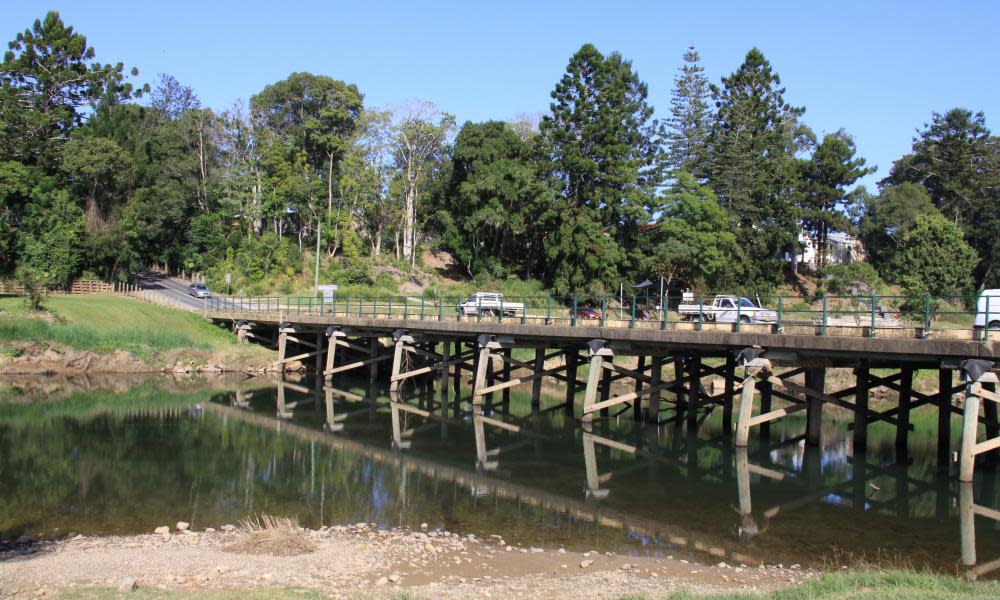NSW coastal towns face anxious wait for rain as water supplies dwindle

Coastal towns in New South Wales face serious water supply constraints if summer rains fail to materialise, with some potentially running out by January.
But the water minister, Melinda Pavey, urged people not to abandon their holiday plans, saying the new list of “day zero” dates for NSW towns was a worst-case scenario based on how long water supplies would last with no inflows and without water restrictions.
Sydney and the Illawarra were placed on level 2 water restrictions on Monday. The Hunter will follow in January.
This means people may water their gardens with only a bucket before 10am and after 4pm, and car washing is also restricted to bucket and sponge. Watering with a hose is banned and residents are urged to restrict their showers to four minutes.
Related: Murray-Darling authority warns of 'dire' summer of mass fish deaths and blue-green algae
The Sunday Telegraph published a list of “day zero” dates for coastal towns, which showed Bellingen running out of water by January, Taree by February, and Port Macquarie and Batemans Bay within a year. Newcastle has only 18 months’ supply, according to the report.
But Pavey played down the extreme urgency of the dates, saying this assumed no rain at all and that usage remained the same.
“I hope we get the beautiful summer rain that we are used to in Sydney and the coastal areas,” she said. “I hope we get some east coast lows. But we have to look at the evidence. We have to look at the inflows, we have to look at the outflows, but this is what the plan says at the moment.
“Bellingen is in my electorate and that’s where I get my showers from. That river is still flowing – it’s only two megalitres a day, which is incredibly low, but it’s still flowing.”
The prediction for day zero dates was based on the river stopping flowing altogether, she said.
As well as implementing water restrictions, the government was working with councils to explore alternative water supplies.
“Because it is an estuarine system as it goes up the river, we are working with council to look at reverse osmosis plants and looking at more groundwater supplies from underneath the river,” she said.
In the case of the Manning, which serves Taree, Pavey said the river had not flowed for 30 days, the longest period of no-flow recorded. The government was looking at more bore fields and treated water from other catchments to assist the dairy industry.
Pavey said the Bureau of Meteorology was hoping for a better outlook in January, although not above average.
“If we get a few storms on the coast that can make a big difference and fill up catchments quite quickly,” she said.
Pavey sought to reassure country residents that level 2 restrictions in the cities were comparable to some of the restrictions in country areas.
She said it was frustrating that water restrictions varied from council to council and between water agencies.
Related: NSW warned of looming Sydney water crisis six months ago, cabinet document reveals
Meanwhile Pavey appeared to offer a more conciliatory bargaining stance on the Murray-Darling Basin plan, after the NSW Nationals’ leader, John Barilaro, said last week he was prepared to pull NSW out of the plan and had sought legal advice about it.
“There is capacity for us to walk away,” Pavey said. “I would prefer to get a better outcome for our nation and our state working collaboratively.”
Water ministers are due to meet next Tuesday.
“The fact that we are having a look at the [South Australian] lakes management, that’s a positive result,” she said.
Pavey also said she supported the appointment of former federal police chief Mick Keelty as the inspector general for the Murray-Darling Basin plan, saying he had a good understanding of the plan.
Labor has accused the National party of scrambling at “five minutes to midnight” to cover for a decade of failures on water policy, as rural and regional towns run dry.
The NSW cabinet was due to consider the state’s position on the Murray-Darling Basin plan on Monday afternoon.

 Yahoo News
Yahoo News 
